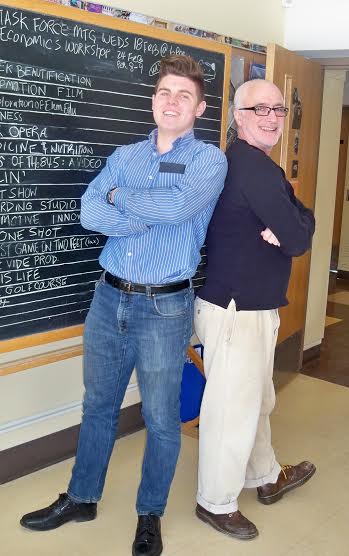Joseph Reeder, an English teacher and WISE mentor at Rondout Valley High School, sheds light on the origins of the word “mentor.” In Greek mythology, Odysseus’ loyal friend was named Mentor. Odysseus entrusted Mentor with the care of his son while he was off battling the Trojans in the Trojan War. Today, the word “mentor” has come to refer to “anyone in a position to offer guidance and support, to lend an ear or a shoulder to cry on”—a definition true to its Greek roots.
After 17 years of mentoring, Joe is filled with a lot of interesting facts and stories about mentoring. He initially became a WISE mentor because he was “drawn to the idea of mentoring a senior involved in a project of his or her choosing” and has since helped over thirty mentees explore their passions in WISE.
Q: What is your most memorable/proudest moment as a mentor?
A: At every WISE presentation, I have gotten weepy–tears of pride—so it is difficult to single out my most memorable experience. Many times there comes a point in the presentation when my mentee describes the impact I have made. That’s when I become emotional. But what is even more moving during the presentation is when I see a new human being, when a student turns into an adult right before my eyes. As a teacher, one often wonders what effect, if any, one has on his students, but in WISE one deeply feels it.
Q: Complete the following sentence: The most difficult part of being a mentor is ___.
A: The most difficult part of being a mentor is resisting the desire to shape the project in the Mentor’s image. The mentor is used to creating curriculum and disseminating knowledge to the student. For 13 years, seniors have sat behind desks and been the vessels into which teachers have poured knowledge. But in WISE, the students design the curriculum and gain knowledge through their individual process. WISE is more of a shared drink of water. A mentor should be prepared to open his or her heart to what the student wants to learn and how the student learns. A mentor should display genuine interest, compassion, and patience and do this with sincerity.
Because the mentor also invests a great deal of intellectual and emotional attention in a mentee, it can feel like the mentor and mentee are working on the project together. But as a mentor, you have to remember that you are not part of their project. You are an eye, you are a net, but you are not an agent. Let your mentee lead the way.
Q: What advice would you give to current/future WISE mentors—whether they are new to the program, or they have been a mentor for many years?
A: It’s all about the process. Success and growth are not necessarily determined by a finished “product” suitable for framing, especially in WISE. Success in WISE comes in all shapes and forms.


 Saving...
Saving...